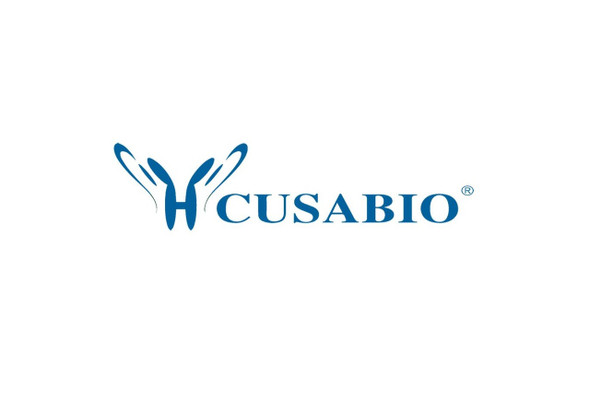Cusabio Human Recombinants
Recombinant Human Exonuclease V (EXO5) | CSB-EP863995HU
- SKU:
- CSB-EP863995HU
- Availability:
- 13 - 23 Working Days
Description
Recombinant Human Exonuclease V (EXO5) | CSB-EP863995HU | Cusabio
Alternative Name(s): Defects in morphology protein 1 homolog
Gene Names: EXO5
Research Areas: Signal Transduction
Organism: Homo sapiens (Human)
AA Sequence: MAETREEETVSAEASGFSDLSDSEFLEFLDLEDAQESKALVNMPGPSSESLGKDDKPISLQNWKRGLDILSPMERFHLKYLYVTDLATQNWCELQTAYGKELPGFLAPEKAAVLDTGASIHLARELELHDLVTVPVTTKEDAWAIKFLNILLLIPTLQSEGHIREFPVFGEGEGVLLVGVIDELHYTAKGELELAELKTRRRPMLPLEAQKKKDCFQVSLYKYIFDAMVQGKVTPASLIHHTKLCLEKPLGPSVLRHAQQGGFSVKSLGDLMELVFLSLTLSDLPVIDILKIEYIHQETATVLGTEIVAFKEKEVRAKVQHYMAYWMGHREPQGVDVEEAWKCRTCTYADICEWRKGSGVLSSTLAPQVKKAK
Source: E.coli
Tag Info: N-terminal 6xHis-SUMO-tagged
Expression Region: 1-373aa
Sequence Info: Full Length
MW: 57.8 kDa
Purity: Greater than 90% as determined by SDS-PAGE.
Relevance: Single-stranded DNA (ssDNA) bidirectional exonuclease involved in DNA repair. Probably involved in DNA repair following ultraviolet (UV) irradiation and interstrand cross-links (ICLs) damage. Has both 5'-3' and 3'-5' exonuclease activities with a strong preference for 5'-ends. Acts as a sliding exonuclease that loads at ssDNA ends and then slides along the ssDNA prior to cutting; however the sliding and the 3'-5' exonuclease activities are abolished upon binding to the replication protein A (RPA) complex that enforces 5'-directionality activity.
Reference: Complete sequencing and characterization of 21,243 full-length human cDNAs.Ota T., Suzuki Y., Nishikawa T., Otsuki T., Sugiyama T., Irie R., Wakamatsu A., Hayashi K., Sato H., Nagai K., Kimura K., Makita H., Sekine M., Obayashi M., Nishi T., Shibahara T., Tanaka T., Ishii S. , Yamamoto J., Saito K., Kawai Y., Isono Y., Nakamura Y., Nagahari K., Murakami K., Yasuda T., Iwayanagi T., Wagatsuma M., Shiratori A., Sudo H., Hosoiri T., Kaku Y., Kodaira H., Kondo H., Sugawara M., Takahashi M., Kanda K., Yokoi T., Furuya T., Kikkawa E., Omura Y., Abe K., Kamihara K., Katsuta N., Sato K., Tanikawa M., Yamazaki M., Ninomiya K., Ishibashi T., Yamashita H., Murakawa K., Fujimori K., Tanai H., Kimata M., Watanabe M., Hiraoka S., Chiba Y., Ishida S., Ono Y., Takiguchi S., Watanabe S., Yosida M., Hotuta T., Kusano J., Kanehori K., Takahashi-Fujii A., Hara H., Tanase T.-O., Nomura Y., Togiya S., Komai F., Hara R., Takeuchi K., Arita M., Imose N., Musashino K., Yuuki H., Oshima A., Sasaki N., Aotsuka S., Yoshikawa Y., Matsunawa H., Ichihara T., Shiohata N., Sano S., Moriya S., Momiyama H., Satoh N., Takami S., Terashima Y., Suzuki O., Nakagawa S., Senoh A., Mizoguchi H., Goto Y., Shimizu F., Wakebe H., Hishigaki H., Watanabe T., Sugiyama A., Takemoto M., Kawakami B., Yamazaki M., Watanabe K., Kumagai A., Itakura S., Fukuzumi Y., Fujimori Y., Komiyama M., Tashiro H., Tanigami A., Fujiwara T., Ono T., Yamada K., Fujii Y., Ozaki K., Hirao M., Ohmori Y., Kawabata A., Hikiji T., Kobatake N., Inagaki H., Ikema Y., Okamoto S., Okitani R., Kawakami T., Noguchi S., Itoh T., Shigeta K., Senba T., Matsumura K., Nakajima Y., Mizuno T., Morinaga M., Sasaki M., Togashi T., Oyama M., Hata H., Watanabe M., Komatsu T., Mizushima-Sugano J., Satoh T., Shirai Y., Takahashi Y., Nakagawa K., Okumura K., Nagase T., Nomura N., Kikuchi H., Masuho Y., Yamashita R., Nakai K., Yada T., Nakamura Y., Ohara O., Isogai T., Sugano S.Nat. Genet. 36:40-45(2004)
Storage: The shelf life is related to many factors, storage state, buffer ingredients, storage temperature and the stability of the protein itself. Generally, the shelf life of liquid form is 6 months at -20?/-80?. The shelf life of lyophilized form is 12 months at -20?/-80?.
Notes: Repeated freezing and thawing is not recommended. Store working aliquots at 4? for up to one week.
Function: Single-stranded DNA (ssDNA) bidirectional exonuclease involved in DNA repair. Probably involved in DNA repair following ultraviolet (UV) irradiation and interstrand cross-links (ICLs) damage. Has both 5'-3' and 3'-5' exonuclease activities with a strong preference for 5'-ends. Acts as a sliding exonuclease that loads at ssDNA ends and then slides along the ssDNA prior to cutting; however the sliding and the 3'-5' exonuclease activities are abolished upon binding to the replication protein A (RPA) complex that enforces 5'-directionality activity.
Involvement in disease:
Subcellular Location: Nucleus, Cytoplasm, cytosol
Protein Families: EXO5 family
Tissue Specificity:
Paythway:
Form: Liquid or Lyophilized powder
Buffer: If the delivery form is liquid, the default storage buffer is Tris/PBS-based buffer, 5%-50% glycerol. If the delivery form is lyophilized powder, the buffer before lyophilization is Tris/PBS-based buffer, 6% Trehalose, pH 8.0.
Reconstitution: We recommend that this vial be briefly centrifuged prior to opening to bring the contents to the bottom. Please reconstitute protein in deionized sterile water to a concentration of 0.1-1.0 mg/mL.We recommend to add 5-50% of glycerol (final concentration) and aliquot for long-term storage at -20?/-80?. Our default final concentration of glycerol is 50%. Customers could use it as reference.
Uniprot ID: Q9H790
HGNC Database Link: HGNC
UniGene Database Link: UniGene
KEGG Database Link: KEGG
STRING Database Link: STRING
OMIM Database Link: N/A









